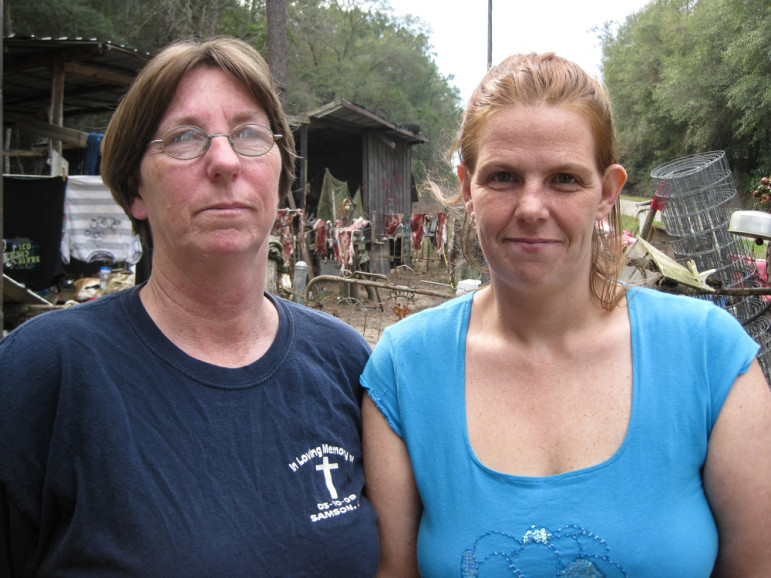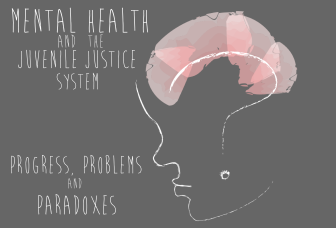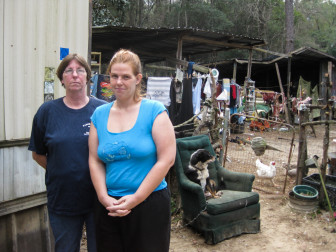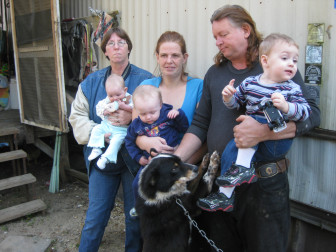For a former juvenile offender diagnosed with bipolar disorder, the pains of adolescence persist into adulthood.

James Swift / JJIE
Tonora Mathis, on the left, with her daughter, Nicole Mathis, at Nicole's home in Geneva, Ala. As a teenager, Nicole was sent to a “boot camp” program, where she alleges physical abuse at the hands of staffers and personnel unprepared to meet her mental health needs.
GENEVA, Ala. – Outside this bucolic, Deep South hamlet, down a grassy country road and up against a small pond, sits the gold and brown mobile home of the Mathis family.
Several deer hides are draped over the chain link fence. An old radio blares the Oak Ridge Boys’ “Elvira” at full volume. The family dog barks, the family ducks quack, while the family donkey, Frank, brays in the front yard.
“It’s my ranch, and it’s my home,” said Nicole Mathis. The 30-year-old native of Geneva -- a small town, about 50 miles north of the Gulf of Mexico and 100 miles south of Montgomery -- said she’s lived at the residence for the last three years, alongside her husband and four of her five children. Her eldest daughter lives with Nicole’s mother, 55-year-old Tonora Mathis, who said she’s lived in the town practically her entire life.

Katy McCarthy / JJIE
Read more from the series: Mental Health and the Juvenile Justice System: Progress, Problems and Paradoxes.
Geneva’s rustic scenery, however, belies some gritty statistics. According to 2000 Census data, nearly one-fifth of Geneva County’s population lived below the poverty line, including 27 percent of its minors.
“In Geneva, there aren’t a whole lot of rich people,” said Ed Harrison, a retired probation officer who served the community from the early 1990s until the mid 2000s. “There’s either middle class, low middle class, or they’re poor.”
Like Geneva, an undercurrent of turmoil also lurks beneath the seemingly placid lives of the Mathis family. Since the age of 8, Nicole has struggled with several diagnosed mental illnesses, which tortured both her and her mother for a majority of her childhood.
Nicole’s story is one demonstrating both how far -- and how little -- mental health treatment in the nation’s juvenile justice systems have progressed. In a state fraught with Department of Youth Services troubles, she did not receive intensive treatment or rehabilitative services when she entered Alabama’s juvenile justice system.
Instead, she was sent to a “boot camp” program, where she alleges physical abuse at the hands of staffers and personnel unprepared to meet her mental health needs.
“I Took Bruises Everyday”
Both Nicole and her mother speak in a Southern patois, a linguistic cocktail of double negatives and regional colloquialisms. Tonora, a sales associate at the local Wal-Mart, said there really isn’t much going on in the area. Outside of a few department stores and a plant that manufactures aluminum bleachers, she said employment options in the town are scant. “The only other thing around here other than that, is just you work to go home,” she said.
 Nicole -- who said dropping out of high school in the 12th grade was one of the biggest mistakes of her life -- remembered being picked on in elementary school. She also recalled being filled with a tremendous rage throughout a majority of her childhood, which occasionally led her to physically attacking her classmates and teachers.
Nicole -- who said dropping out of high school in the 12th grade was one of the biggest mistakes of her life -- remembered being picked on in elementary school. She also recalled being filled with a tremendous rage throughout a majority of her childhood, which occasionally led her to physically attacking her classmates and teachers.
“I got in so much trouble,” she said. “I almost stabbed a little boy with a pair of scissors. I beat the living stew out of a little girl for talking bad about me. I threatened a teacher, a substitute teacher. I told her I was going to kill her.”
Tonora said her daughter was diagnosed with attention deficit disorder (ADD) and attention deficit hyperactivity disorder (ADHD) when she was 8 years old. “She just couldn’t pick it up, her letters, her reading, all that stuff,” Tonora said. She said her daughter was prescribed Ritalin; shortly thereafter, Tonora said, the family lost Medicaid, and Nicole was temporarily taken off the medication.
As a youngster, Nicole’s mother said her daughter was prone to violent outbursts. “It was like she was having blackout spells,” Tonora said. “She didn’t know what she was doing.” She recalled a particular outburst that was so severe that she and her husband had to drive their daughter to a local police department. She recalled locking the doors of her truck and having to physically restrain Nicole until they arrived at the station.
Frequently, Nicole would lash out at members of her own family. “I took bruises everyday,” Tonora said. “We thought she was just doing that to rebel.”
“They Kept Me In There One Time For 24 hours”

James Swift / JJIE
Tonora Mathis, on the left, with her daughter, Nicole Mathis, at Nicole's home in Geneva, Ala.
Before she was in middle school, Nicole had already been sent to a juvenile “boot camp” in Chalkville, Ala. She would end up serving multiples stints at the facility -- in addition to a brief stay in a diversion center and a group home -- throughout her early teen years.
At the boot camp, Nicole said she was subjected to abuse and mistreatment from staffers. During a physical training drill, she said staffers forced her to perform certain exercises. “They even held me on the ground and tried to make me do the push ups,” she stated. “One lady put her foot on my back to hold me down.”
Camp rules and regulations were also harsh, she recalled. Access to toilet paper and feminine hygiene products were limited, she said, and her and other residents had to take cold showers in the middle of winter.
Tonora said she could only see her daughter once a month, for two-hour visits. “It was supposed to be like a six-week program, but in her case, it would last two or three months.” Nicole said that a tiered release system, which included demerits, frequently prevented her from finishing the program on time. To “graduate” from the boot camp, Nicole said the residents had to complete a rappel tower exercise; a feat she could never accomplish due to her fear of heights.
One day, she said a staffer threw a shoe at her. “She physically took her shoe off, and threw it at me,” Nicole recalled. “So I threw it back at her.” As a result, she was placed in solitary confinement -- a punishment she referred to as “the timeout room.” When she began kicking the room’s metal door, several staffers confronted her.
“They stripped me from my shoes, my socks, my underwear, my bras,” she said. “And put me in handcuffs and shackles.” Her hands tied to her feet, she claims to have been locked in the room, completely naked. “They even took the rubber band that you had in your hair out,” she said.
Nicole said she was stripped and placed in confinement on multiple occasions. Once, she said staffers placed a helmet on her head, to keep her from slamming her skull against the room’s door. “They kept me in there one time for 24 hours,” she said. “You didn’t have a mattress in that room. It was nothing but a floor with tile on it.” Another time, Nicole said she was stripped and placed in isolation, so staffers could search her room for “weapons” after a plastic fork was discovered in her dorm.
“We wanted to tell our parents what was going on and how they were treating us, but we could not put that in our letters,” she said. “They read every letter that we sent out, every phone call we made, they scanned.”
“I Wanted Everything to End”

James Swift / JJIE
Tonora Mathis (Nicole's mother), Nicole Mathis and Nicole's Husband, Don Ray Kazee, holding Nicole and Don's children at Nicole's home in Geneva, Ala.
Tonora said she didn’t know about Nicole’s experiences until she came home. “When we went up there, we was in this room, and they monitored and heard everything that everybody said. If they said anything they were not supposed to, then their time would be cut, and we would have to leave.”
Tonora, at one point, considered taking legal action, but became discouraged after talking to several of her acquaintances. “They said that with it being a boot camp, that a lot of that stuff is what they done,” she stated. “So I just let it go.”
In 2001, several ex-detainees at the Chalkville campus filed a federal lawsuit, alleging physical abuse at the hands of staffers -- with some claims dating as far back as 1994. The suit resulted in the firing of several Department of Youth Services employees, and eventually, Alabama’s DYS agreeing to pay $12.5 million to four dozen plaintiffs in 2007.
During Nicole’s stay at boot camp, she was diagnosed with bipolar disorder. “They told me they did not want me to tell her,” Tonora said. As a result, Nicole didn’t learn that she was bipolar until she turned 20.
Tonora said that the staffers feared Nicole would react violently if she knew she had been diagnosed with the disorder. Earlier, when Nicole learned that her grandmother had died, staffers had to physically prevent her from running away from the facility. Fearing a similar incident, Tonora decided to not tell her daughter about the new diagnosis.
Nicole’s medication and treatments, Tonora said, did not change, even after the diagnosis. “Well, they did up her dosage,” she said. “But other than that, there was nothing that was changed.”
Finding out that Nicole was bipolar changed how Tonora thought about her daughter’s behavior. “With the bipolar thing, then it was a different story,” she said. “[Boot camp administrators] kind of backed off, and we had to learn how to just deal with it.” After Nicole’s release from the facility, Tonora said her daughter was never placed in therapy or specialized programs for bipolar disorder; instead, Nicole was placed on what her mother called “very strong medication,” including several anti-depressants.
Nicole rattles off the list of medications she was on when she was young as if she were reciting items from a grocery list; “Geodon, Trazodone, Lexapro,” she recalled. At one point, she said she was on enough medications to fill a large lunch box.
Having difficulties coping with her daughter’s experiences, Tonora said she also began taking prescription drugs. “I wound up on medicine,” she said. “I wanted everything to end.”
Do What You Can To Make It Better
After dropping out of high school, Nicole said she has been arrested several times, including once for attacking a minor. “I still think about everything I done back then,” she said, “I try to give good advice, as much as I can, to help other children.”
Now, Nicole said she’s trying her best to handle her oldest daughter. “She’s gotten to the point that sometimes she’ll listen, and sometimes she won’t,” she said. “I don’t want to see no other parent, and I don’t want to see no other child, go through what I’ve went through.”
Nicole said that no one deserves to go through the experiences she had to as an adolescent. “It’s not right for the children to put their mom and their dad through the heartache and pain,” she added. “Jail’s not a good place [and] the juvenile system is not a good place for them to be.”
Nicole reflects upon her experiences as a youth, and advises families of children with similar disorders to monitor the behaviors of their sons and daughters very closely. “I let people get under my skin,” she said, “it flared me up to the point that I would just [beat up] everybody.”
Children need a safe outlet for their hostilities and frustrations, she said. “If they want to get out there and hit a punching bag all day, let them.”
In hindsight, she blames many of the problems she encountered as a teen and young adult on the heavy doses of medication she was taking. She claims that the prescription drugs hindered -- not helped -- her, and just made her a more ferocious “troubled child.”
Tonora’s advice for mothers in similar predicaments is simple, yet heartfelt. “If you don’t go see them, it makes it a lot worse,” she said. “No matter what they do, you’ll always love them, and try to do what you can to make it better.”
